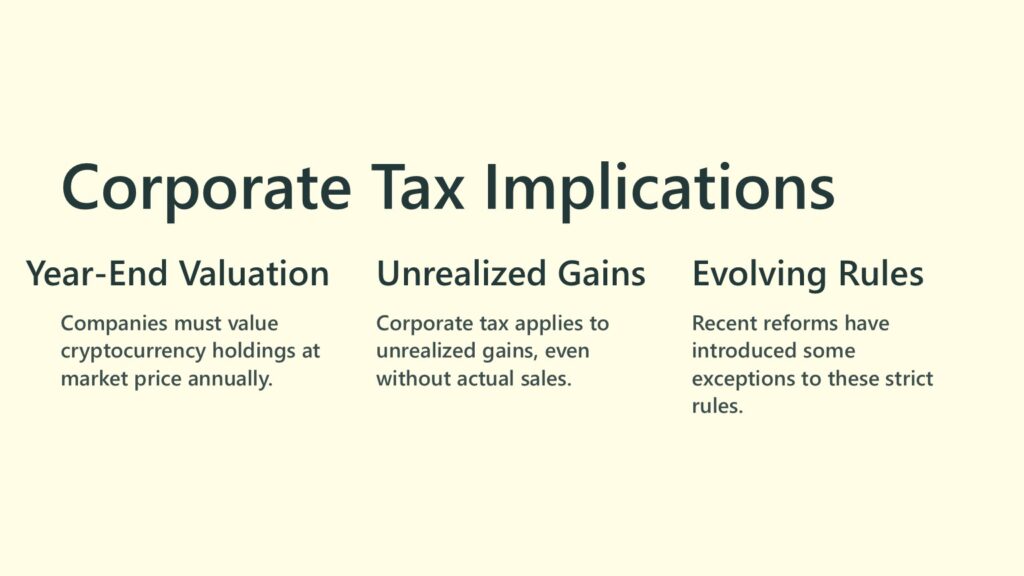When you give cryptocurrency to family members or controlled companies, or sell it for much less than its worth, you need to be aware of important tax consequences. Japanese tax law has specific rules about how gifts and below-market sales of inventories are taxed. These rules also apply to cryptocurrency, requiring you to calculate taxes as if you had sold it at full market value.
Tax Rules for Gifts and Below-Market Sales

The tax law sets out how to handle taxes when you gift inventories or sell them significantly below their value. Here’s what you need to know:
- For a gift or bequest: When you give away inventory as a gift, you must include its market value (at the time of gifting) in your taxable revenue (Article 40, Paragraph 1, Item 1 of the Income Tax Act). This amount will be part of your business or miscellaneous income for that tax year. In other words, even though you don’t receive any payment from the recipient, the tax office treats it as if you had sold the item at its full market value.
- For Below-Market Sales: If you sell inventory at a price significantly below its market value, the difference between the market value and your actual sale price is treated as a gift and added to your taxable revenue (Article 40, Paragraph 1, Item 2 of the Income Tax Act). This means that even though you’re technically selling the item for less than its market value, you’ll be taxed as if you had sold it at the full market value.
Practical Guidelines
The key factor here is understanding what “market value” means – generally, it refers to the “normal selling price.” For tax purposes, there are two important rules:
- When calculating business income, tax authorities will accept reported revenue if the sale price is at least 70% of the normal selling price and exceeds the original purchase cost (Basic Directive on the Income Tax Act 39-1, 39-2).
- Any sale made below 70% of the item’s market value automatically qualifies as a “below-market sale” for tax purposes (Basic Directive on the Income Tax Act 40-2).
For example, the National Tax Agency provides the following case (National Tax Agency “Tax Treatment of Cryptocurrency (FAQ)” (Revised December 2023) 2-10):
Let’s say you:
・Bought 1 BTC for 450,000 yen on April 9
・Sold it for 450,000 yen on May 20
・Market value at sale time was 1,000,000 yen
・(Not counting transaction fees)
Testing if this is a below-market sale:
- Sale price: 450,000 yen
- 70% of market value: 1,000,000 yen × 70% = 700,000 yen
- Since 450,000 yen is less than 700,000 yen, this counts as a below-market sale
Taxable Income Calculation:
- Actual sale price: 450,000 yen
- Plus difference up to 70% of market value: (700,000 – 450,000) yen
- Gross revenue: 700,000 yen
- Minus purchase cost: 450,000 yen
- Taxable income: 250,000 yen
Are There Exceptions for Cryptocurrency?
In certain cases, Japanese tax law (Article 40 of the Income Tax Act) does not treat below-market sales as taxable gifts. For example, when retailers sell products at a discount due to defects, outdated fashion, or for advertising purposes, these transactions may be exempt from gift tax rules (Basic Directive on the Income Tax Act 40-2 (Note)).
However, it is unclear whether these exceptions also apply to cryptocurrency, as the National Tax Agency has yet to clarify its stance.
Harsh Tax Treatment for Cryptocurrencies in Japan

While Article 40 of Japan’s Income Tax Act typically applies to inventory assets, cryptocurrencies face unique and stricter treatment. Although cryptocurrencies are technically not classified as “inventory” under the Income Tax Act (Article 2, Paragraph 1, Item 16), they are still subject to Article 40’s provisions through separate regulations (Article 87 of the Order for Enforcement).
Due to cryptocurrency’s volatile nature, unrealized gains and losses can be substantial. Under Article 40, if you gift cryptocurrency or transfer it at below market value, you’re taxed as if you had sold it at market price – meaning any unrealized gains become taxable.
This creates an important distinction from other assets: Article 40 applies to cryptocurrency transfers regardless of why you hold them. With regular inventory items, tax treatment often depends on whether they’re held for business/trading purposes. You cannot avoid these tax implications by arguing “I wasn’t holding the cryptocurrency for sale, so Article 40 shouldn’t apply to my gift or discounted transfer.”
As cryptocurrency use evolves beyond trading to include various purposes, Japan’s tax framework may need updating to address:
- Gift tax implications
- Taxation of below-market transfers
- Year-end valuation rules for corporations

For businesses, the rules are particularly strict: Japanese companies must generally value their cryptocurrency holdings at market price at year-end and pay corporate tax on any unrealized gains (Article 61, Paragraph 3 of the Corporate Tax Act). This means taxes may apply even without any actual sale. While recent reforms have introduced some exceptions, this overall treatment continues.
Why This Rule Exists
Some may believe this provision is meant to prevent avoiding taxes through gifting or selling cryptocurrency below market value. Others might argue that it’s in place because cryptocurrency is typically held to be sold for profit, so taxing it at market value makes sense, even for gifts or discounted transfers.
Tax Impact on Recipients
The tax implications for recipients depend on their status:
・Individual recipients may need to pay gift tax
・Corporate recipients may need to pay corporate tax


